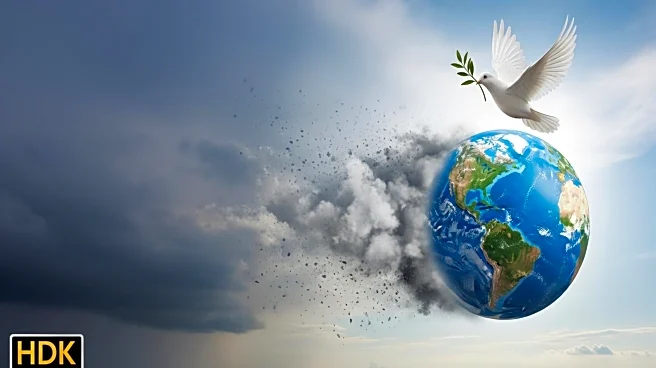What's Happening?
Iranian President Masoud Pezeshkian has reaffirmed Iran's commitment to the Treaty on the Non-Proliferation of Nuclear Weapons (NPT), despite growing regional tensions and internal pressures to abandon the agreement. This announcement comes in the wake of recent Israeli attacks that have heightened regional cohesion among Iran and Arab nations in the Persian Gulf. Pezeshkian, speaking at the United Nations General Assembly, emphasized that Iran's decision to remain in the NPT is independent of support from strategic partners like China and Russia. The Iranian president also highlighted a $25 billion deal with Russia to construct nuclear plants in Iran, underscoring the country's commitment to peaceful nuclear development. Despite looming economic sanctions, Pezeshkian expressed confidence in Iran's self-reliance and the support of its people and supreme leader.
Why It's Important?
The reaffirmation of Iran's commitment to the NPT is significant as it impacts regional security dynamics and international relations. Iran's decision to stay in the treaty could prevent further escalation of nuclear tensions in the Middle East, which is crucial for global stability. The move also signals Iran's intent to pursue diplomatic solutions despite external pressures and internal dissent. The strengthening of ties between Iran and other Gulf nations, as well as the collaboration with Russia, could shift power balances in the region, potentially isolating Israel and altering its strategic calculations. This development may influence U.S. foreign policy, especially in light of President Trump's stance on Iran's nuclear capabilities.
What's Next?
Iran's commitment to the NPT may lead to renewed diplomatic efforts to resolve nuclear tensions, particularly with European nations and the U.S. However, the failure of the U.N. Security Council to prevent snapback sanctions could complicate these efforts. The regional cohesion against Israel might prompt further defensive agreements among Gulf nations, potentially increasing military collaborations. The U.S. and Israel may need to reassess their strategies in the region, considering the growing unity among Iran's allies. The situation remains fluid, with potential for both diplomatic breakthroughs and further conflicts.
Beyond the Headlines
Iran's decision to remain in the NPT, despite internal pressures, highlights the complex interplay between national sovereignty and international agreements. The situation underscores the challenges faced by nations in balancing domestic interests with global commitments. The evolving regional dynamics may lead to long-term shifts in alliances and power structures, influencing future geopolitical strategies. The emphasis on peaceful nuclear development reflects Iran's attempt to redefine its international image amidst accusations of pursuing nuclear weapons.









